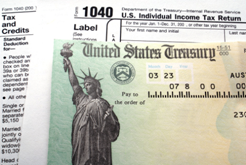
Cash is King – IRS Form 8300
By Steven A Leahy
Recently, I received a telephone call from a business owner in his accountant’s office. They wanted some information about large cash payments the business received 18 months prior. I immediately shut the conversation down and insisted they come to my office if they wanted to discuss this matter with me. I did that because, with the accountant privy to our conversation, the conversation conflicted with the traditional doctrine of attorney-client privilege. What they were discussing possibly involved illegal activity, and not something you want to talk about in mixed company.
Federal law requires that all cash payments more than $10,000.00 must be reported to the IRS with Form 8300. In general, the law requires that anyone engaged in a trade or business – “in the course of such trade or business, receives more than $10,000.00 in cash in 1 transaction (or 2 or more related transactions)” shall file the proper cash transaction forms. If Form 8300 is required, it must be filed within 15 days after the date the cash transaction occurred. Form 8300 must include “the name, address, and TIN of the person from whom the cash was received.”
Not only must you file IRS Form 8300, you must furnish a “written statement” to each person “from whom the cash was received.” That written statement must be provided “on or before January 31 of the year following the calendar year for which [Form 8300] was required to be made.”
A transaction could be the sale of a machinery, construction work for a home owner, or repair work for a vehicle. The cash payment can be a lump sum of $10,000.00 or more; Installment payments that cause total cash received within one year of the initial payment to total more than $10,000.00, or; Previously unreported payments that cause the total cash received within 12-month period to total more than $10,000.00.
For example, let’s say a customer agrees to buy a piece of equipment for $14,000.00. He pays you $9000.00 in a cashier’s check and the balance 10 days later with $5,000.00 cash. This is a cash transaction and must be reported. You have received more than $10,000.00 cash. Because “Cash” may include cashier’s checks, bank drafts, travelers checks and money orders with a face value of $10,000.00 or less. Confused yet?
Wait, there’s more. The law also requires that you report suspicious transactions. For example, if you suspect the customer is attempting to prevent a Form 8300 from being filed – you must file Form 8300. What you must NOT do – EVER – is help the customer structure the transaction to avoid the Form 8300 reporting requirement.
Failure to file Form 8300, when required, may result in civil penalties. The penalties can amount to millions of dollars. Worse, a person may be subject to criminal penalties. The criminal penalties are generally for willful behavior, and include fines up to $100,000.00 and/or imprisonment up to 5 years, plus the cost of prosecution. The criminal penalties apply to those whom attempt to structure the transaction in such a way that would make it seem unnecessary to file Form 8300.
Receiving cash payments in a transaction can cause BIG problems. Who must file Form 8300, when that form must be filed, what constitutes cash, the transactions that trigger the requirement and the penalties that follow non-compliance are often difficult to understand. Don’t play games – get advice!
So, if you receive large cash payments, you should work with a local law firm that will work with you to stay in compliance with these complicated laws. You should give me a call – Opem Tax Resolutions & The Law Office of Steven A. Leahy, PC (312) 664-6649. Call NOW to set up your FREE Consultation.
